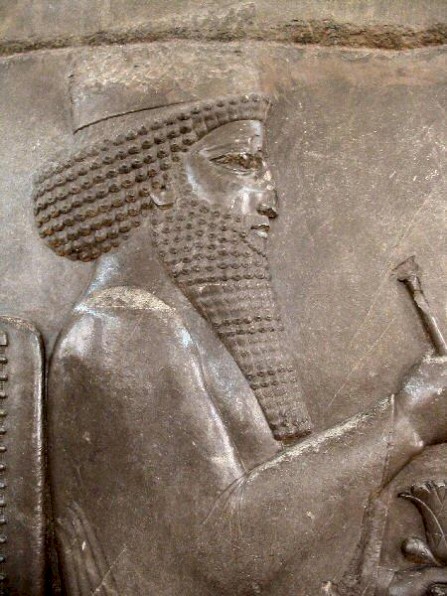Darius the Great: Youth
Darius I (Old Persian Dârayavauš): king of ancient Persia, whose reign lasted from 522 to 486. He seized power after killing king Gaumâta, fought a civil war (described in the Behistun inscription), and was finally able to refound the Achaemenid empire, which had been very loosely organized until then. Darius fought several foreign wars, which brought him to India and Thrace. When he died, the Persian empire had reached its largest extent. He was succeeded by his son Xerxes.

We know almost nothing about Darius' career prior to his rise to power in 522. However, we can make some reasonable inferences from the little details that we do know.
In the first place, we know from the Behistun inscription and Herodotus that Darius' father's name was Hystaspes. Herodotus informs us that this man was in the Persian army during the last war of Cyrus the Great, which took place in 530. The Greek researcher also tells that after a dream that seemed to predict Darius' reign, Cyrus became suspicious of the son of Hystaspes, who was "about twenty at that time and had been left behind in Persia because he was too young for war". Herodotus adds that Cyrus sent back Hystaspes to control Darius. A few days later, Cyrus was killed in action. We cannot check Herodotus' words, but there is no reason to doubt the truth of his casual remark about Darius' age. It means that he was born in c.550, and we have no evidence to contradict this.
Either Cyrus or his son and successor Cambyses appointed Hystaspes as satrap (governor) of Parthia. It was in this quality that he played an important role during the civil war which broke out in 522. Already in Antiquity, it was believed that Hystaspes was the protector of Zarathustra, the founder of a new religion called Zoroastrianism. This is incorrect, however. The Vištâspa who protected the prophet, lived several centuries earlier. This does not exclude the possibility that Darius was a Zoroastrian, but it is very hard to prove this popular hypothesis.
Herodotus tells that during the conquest of Egypt, Darius visited Memphis, where he met a Greek from Samos named Syloson (more). At that time, Herodotus says, Darius was "one of the lance carriers of Cambyses and not of any particular importance". The problem with this statement is that Herodotus seems to be unaware that the word doryphoros, "lance carrier", he uses so innocently, is probably a translation of arštibara, the title of one of the most important court offices. Whatever he may have been, Darius was certainly a man "of particular importance".
This is all we know about Darius' life before his accession. It is not much, but sufficient. When Cambyses died in July, the army was left without commander, and Darius, the arštibara, now unexpectedly became general. The situation was perhaps comparable to that of the army of "the ten thousand" more than a century later: suddenly finding themselves without commanders, the soldiers chose new leaders, who gained prestige when they were able to keep the army intact and safe. Darius' rise to power must have been more or less identical.
Other noblemen accepted him in this position. Some of them were closely related to Cambyses (e.g., Otanes) and they may have been thinking of becoming king themselves, but were unable to show their ambitions too clearly. To them, Darius, who was not closely related to Cambyses, was a dangerless interim-leader. But they had underestimated the twenty-eight year old Darius, because everything changed in September, when Darius made contact with the conspirators, killed Gaumâta and had himself proclaimed king. The first thing Darius now had to do, was improve his position and weed out opposition among the Persians - which certainly must have existed. As we will see, a man named Vahyazdâta was to lead a rebellion.